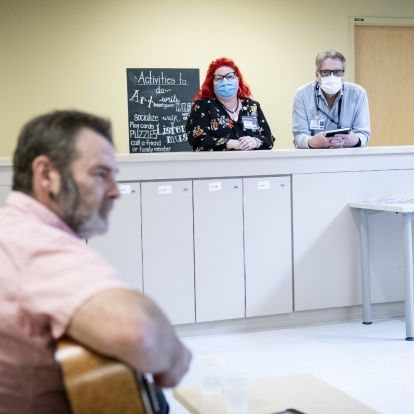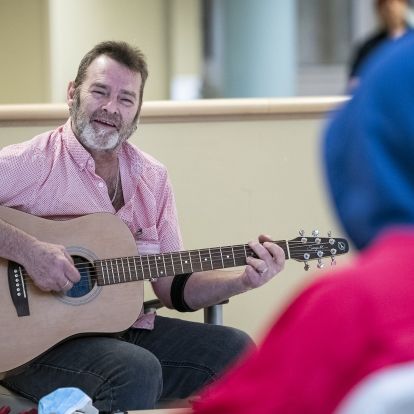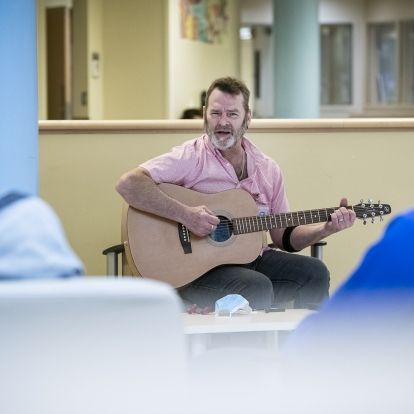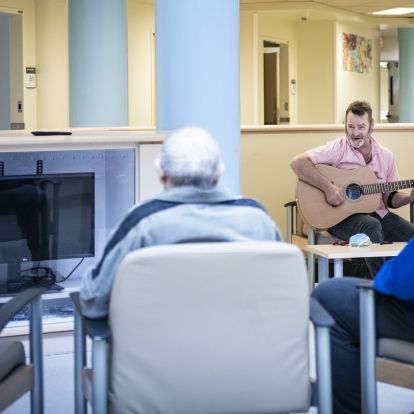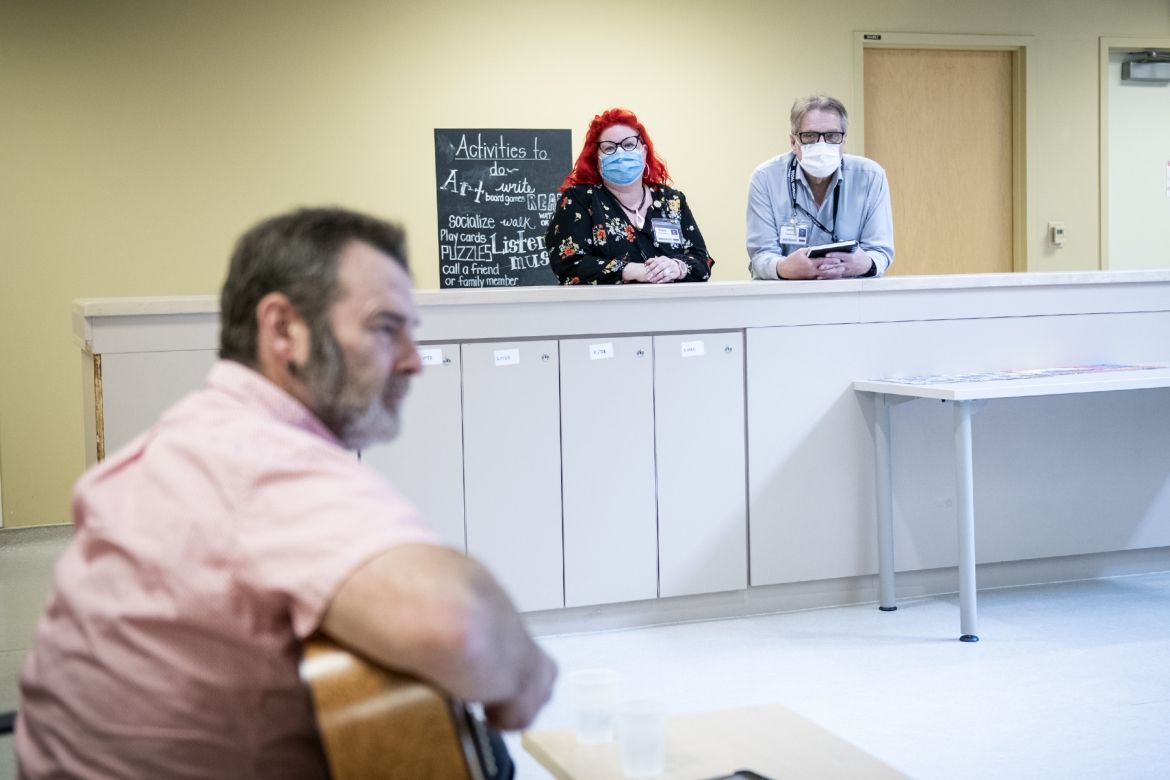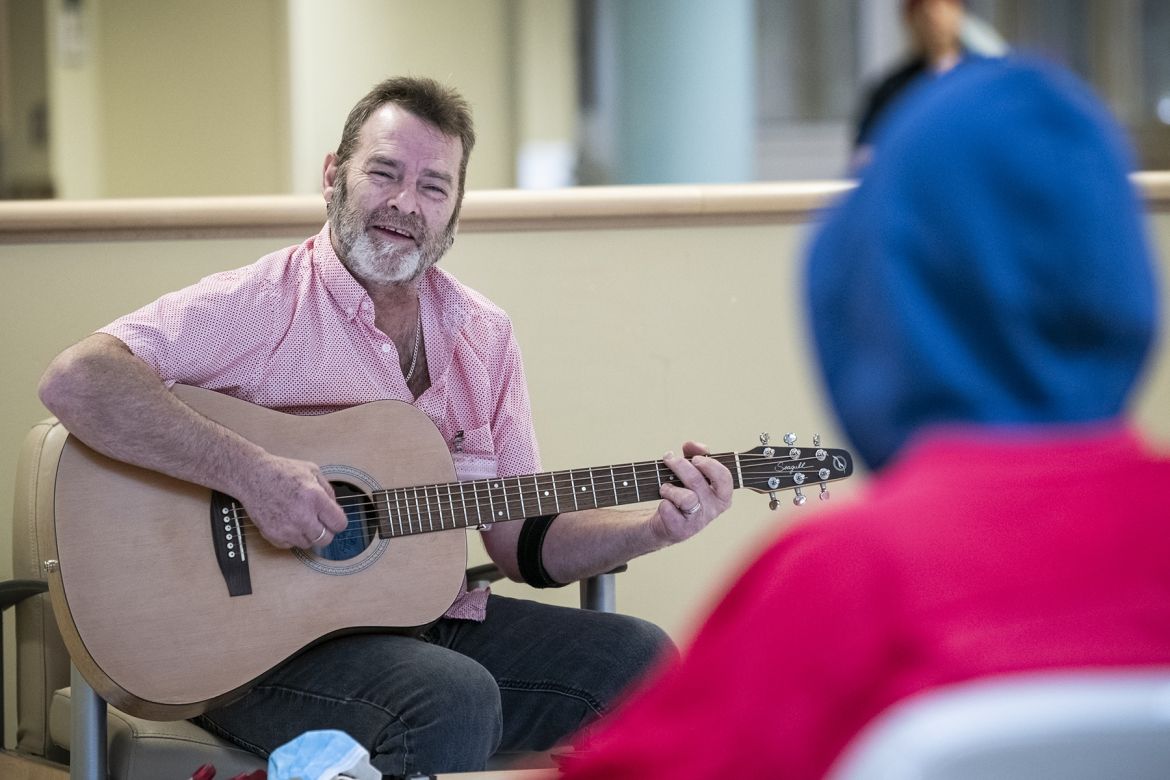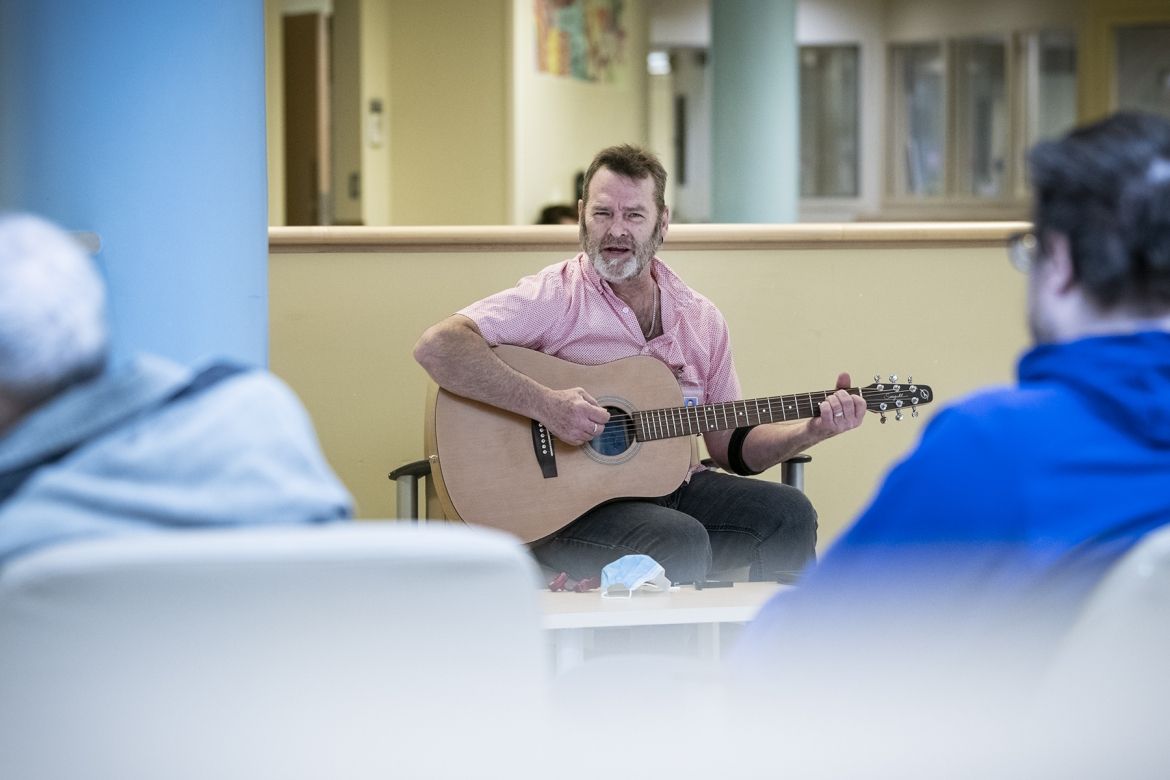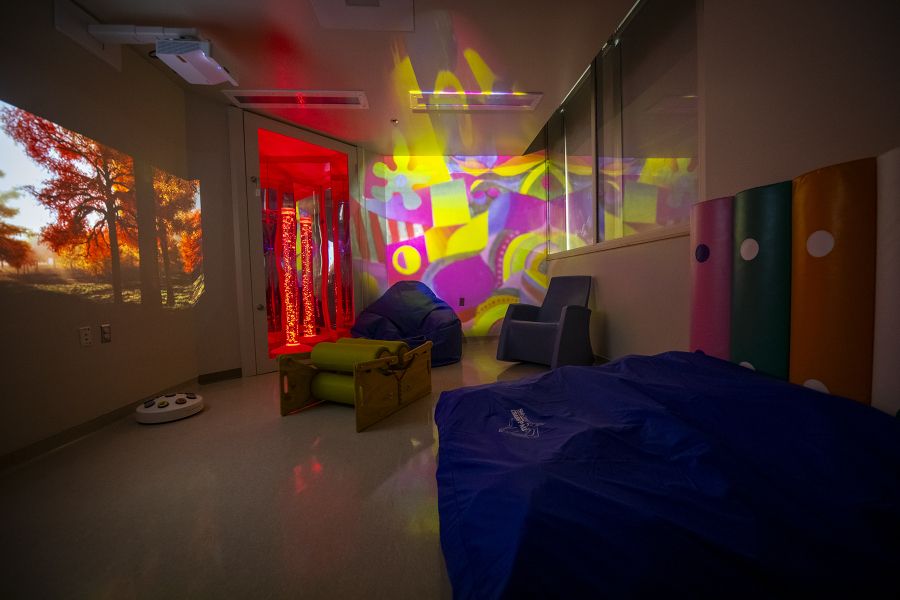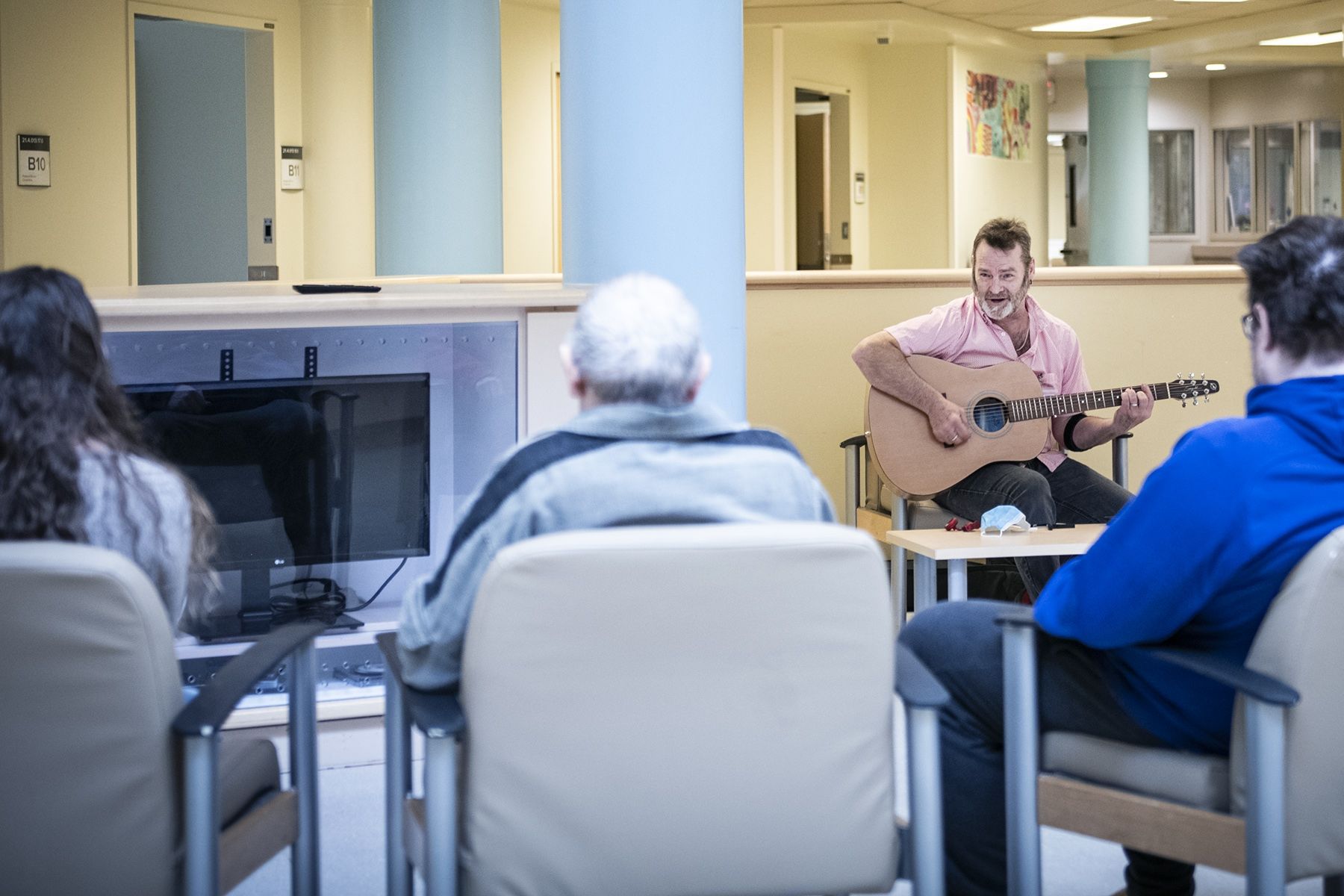
The Mental Health and Addictions Care team at KHSC is researching the profound effects of music therapy on patients in the Burr 4 inpatient psychiatric unit. Part of a multi-phase inquiry, years in the making, the research project is already showing incredible insights into the role of music in supporting patient recovery.
“The effects of music therapy on patients with mental health challenges have been well observed, but rigorous scientific research into the field is still relatively new,” says Dr. Elvina Chu, psychiatrist and research lead for the project. “We’re applying a structured research approach to in the inpatient care setting to identify tangible benefits on patient care, and what we’re seeing is really exciting.”
The findings from this project have the potential to change how music therapy is used in inpatient mental health care, not at KHSC, but across the field.
Passive music listening: an invitation to healing
The first phase of the project, running from November 2023 to February, 2024 focused on passive music listening. A selection of ambient classical and meditative/spa music, was played in the communal dining room at mealtimes to encourage patients to engage more with their surroundings.
This started with a survey by asking patients if they wanted to hear more music. The answer was a resounding “yes” from both patients and staff.
Patient questionnaires, rating depression, anxiety and sleep quality were collected at admission and discharge.
“Initial findings are promising,” says Dr. Chu. “Of 28 patients surveyed, a significant decrease in levels of depression during their course of admission was identified.”
A significant reduction in aggression from patients otherwise known as “code whites” were also noted when data from this timeframe was compared with the corresponding period in 2022-2023. These episodes are a challenge for staff, but they also create barriers to a supportive care environment for patients.
“The type of engagement we’re seeing is incredible,” says psychotherapist James Graham. “Some people on the floor are usually quite isolated. They’ll stay in their rooms and refuse to engage with anyone, which doesn’t really help with their recovery.”
The music changes everything, says Graham:
“One day, they’ll crack the door a bit. The next day, it might be fully open. Eventually they come out and have a shared meal in the common area. We’re watching people open up in real time and it’s incredible to see the progression firsthand.”
In a given week, staff observe that around half of the patients (usually 14 or15 out of a 32 bed count) will join in shared areas to listen to the music.
The science behind the magic
These changes might seem incredible, but they’re scientifically rooted in our physiology. The polyvagal nerve system, which governs physical responses to mental stimuli, triggers our fight, flight and freeze response mechanisms. It also triggers our nervous system responses, such as a racing heartbeat, heaving breaths, even the “churning” feeling you might feel in your stomach when anxious.
Even at a passive level, music interacts with this system to alleviate distress. Activities like singing can even relax parts of this system located in the throat, facilitating emotional regulation.
In stroke, movement disorders and neurorehabilitation settings, music therapy has demonstrated remarkable potential to facilitate physical movement and stimulate memory even among patients debilitated by dementia.
Much of the research in music comes from long-term care homes, where it demonstrated remarkable potential to stimulate memory and facilitate physical movement, even among patients debilitated by dementia.
“When someone is unresponsive to other interventions, music can keep them grounded,” says Graham, who has worked previously in long-term care homes and has witnessed these effects firsthand. “One minute, they aren’t interacting, but when the music plays, you might see a foot tapping and you know you’re getting through.”
The Burr 4 psychiatric unit includes many seniors living with dementia. Creating programming that can help support them is something that the team continues to strive for.
Bridging theory and application
The second phase of the project introduces live music performances within a structured setting. It’s expected to wrap up by the end of April.
The final phase will be to bring in Neurologic music therapy (NMT). Distinguished by its structured approach and specialized professional training, NMT harnesses the intricate interplay between music and neuroscience to address a spectrum of therapeutic goals in the cognitive, physical and psychological domains.
The inpatient psychiatric unit already has a music therapy program, where local musicians share their talent and experiences, to help patients. This research project now gives that work a scientific and theoretical foundation and introduces the possibility of finding targeted therapeutic approaches for patients.
Patient care assistant Ursula Davis, sees the impact of music therapy:
“The music program that we have on the unit is wonderful, with a mix of equally talented musician's. The patients are excited to sit and enjoy the show, sometimes even with family and friends visiting. The patients are noticeably responding positively to the music days. The music always brings a crowd and sometimes the musicians will even share the stage with patients, which is great.”
The research unfolding promises to set a new standard for patient care.
“This program is an example of the kind of support we want to provide to patients,” says Nicholas Axas, program operational director for Mental Health and Addictions Care. “It brings leading scientific research together with passionate staff and engaged community to help patients. It’s a comprehensive approach that looks at the whole patient.”
This research project is expected to conclude in the summer. Dr. Chu and her team hope to share their findings at the Canadian Psychiatric Association meeting in November, 2024, and exciting plans for further music therapy-based research are on the horizon.

